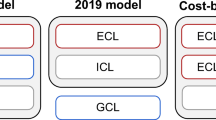Abstract
People with cognitive difficulties, including memory, sequencing and attentional difficulties, face barriers to the use of conventionally designed information systems. This paper explores some of the reasons for these barriers in terms of the expectations normally placed on the user’s cognitive abilities and background knowledge. In the paper, the design and evaluation of three information systems are reported. These systems go some way towards overcoming cognitive barriers, allowing access to the advantages of computers for people with dyslexia, and for older users with no background in computer use who were able to access both email and the World Wide Web through specially designed interfaces.






Similar content being viewed by others
Notes
It should be noted that. in all cases, these prototypes raise more questions than they answer; they are offered as starting points in a different way of thinking about design and in each case there remain many implementation issues, not least in how to offer any additional functionality that might be required, at appropriate times and in appropriate ways.
References
Arkell, H.: An Introduction to Dyslexia: a Dyslexic’s Eye View. A Helen Arkell Dyslexia Centre Publication, Farnham (1997)
British Dyslexia Association. X09: Dyslexia-friendly text. http://www.bda-dyslexia.org.uk/d07xtra/x09frend.htm
Clark, J.: Building Accessible Web Sites. New Riders, Indianapolis (2002)
Crystal, D.: Language and the Internet. Cambridge University Press, Cambridge (2001)
Dickinson, A., Eisma, R., Gregor, P.: Challenging Interfaces/ Redesigning Users. In Proceedings of the Conference on Universal Usability (CUU), pp. 61–68. Vancouver, Canada, 10–11 November 2003
Dickinson, A., Newell, A.F., Smith, M., Hill, R.: Introducing the internet to the over-60s: developing an email system for older novice computer users. Interact. Comput. 17(6), 1–22 (2005)
Dickinson, A., Gregor, P., McIver, L., Hill, R., Milne, S.: The Non Browser: helping older novice computer users to access the web Proceedings of the Accessible Design in the Digital World Conference, Dundee, Scotland, 23–25 August 2005. Electronic Proceedings
Dickinson, A., Hill, R., Gregor, P., McIver, L., Milne, S.: Making sense of content: eye-tracking older, novice users to evaluate an alternative web browser design. In: Abstracts of the 13th European Conference on Eye Movements (ECEM), Bern, Switzerland, 14–18 August 2005
Gregor, P., Dickinson, A., Macaffer, A., Andreasen, P.: See-Word—a personal word processing environment for dyslexic computer users. Br. J. Educ. Technol. 34(3), 341–355 (2003)
Hawthorn, D.: Possible implications of aging for interface designers. Interact. Comput. 12(5), 507–528 (2000)
Jenner, R.A., Rosen, G.D., Galaburda, A.M.: Neuronal asymmetries in primary visual cortex of dyslexic and nondyslexic brains. Ann. Neurol. 46(2), 189–196 (1999)
Light, L.L.: Memory and language in old age. In: Birren, J.E., Schaie, K.W. (eds.) Handbook of the psychology of aging, pp. 275–290. Academic Press, San Diego (1990)
McKeown, S.: Dyslexia ICT: Building on Success. British Educational and Communications Technology Agency, UK (2000)
Microsoft.: Accessible Technology in Computing—Examining Awareness, Use and Future Potential. Available at http://www.microsoft.com/enable/research/default.aspx (2004)
Milne, S., Dickinson, A., Gregor, P., Gibson, L., McIver, L., Sloan, D.: Not Browsing, but Drowning: Designing a Web Browser for Novice Older Users. In: Electronic Proceedings, UAHCI, Las Vegas, Nevada, USA, 22–27 July 2005
Newell, A.F., Carmichael, A., Gregor, P., Alm, N.: Information technology for cognitive support. In: Jacko S.A. (ed) Handbook of Human Computer Interaction, pp. 464–481. Erlbaum, Mahwah, NJ (2003)
Salthouse, T.A., Babcock, R.L.: Decomposing adult age differences in working memory. Dev. Psychol. 27, 763–776 (1991)
Sloan, M.: Web Accessibility and the DDA. J. Infor. Law. Technol. 2001, vol. 2. Available from http://www2.warwick.ac.uk/fac/soc/law/elj/jilt/2001_2/sloan/ Last. Accessed 26 September 2005 (2001)
Snowling, M.: From Language to reading and dyslexia. Dyslexia 7(1), 37–46 (2001)
Syme, A., Dickinson, A., Eisma, R., Gregor, P.: Looking for help? Supporting Older Adults’ Use of Computer Systems. In: Rauterberg, M., Menozzi, M., Wesson, J. (eds.) Human–Computer Interaction INTERACT, pp. 924–931. Zurich, Switzerland, 1–5 September 2003
Wilkins, A.J.: Visual Stress. Oxford University Press, Oxford (1995)
Wilkins, A., Nimmo-Smith, M.I.: The clarity and comfort of printed text. Ergonomics 30(12):1705–1720 (1987)
Willows, D.M., Terepocki, M.: The Relation of Reversals to Reading Disabilities. In: Willows, D.M., Kruk, R.S., Corcos, E.(eds.) Visual Processes in Reading and Reading Disabilities, pp. 31–56. Lawrence Erlbaum Associates, London (1993)
Zaphiris, P., Kurniawan, S.H., Ellis, R.D.: Age related differences and the Depth vs. Breadth trade-off in hierarchical online information systems. In: Proceedings of 7th ERCIM Workshop ``User Interfaces for All’’, 2003. Lecture Notes in Computer Science, pp. 303–314. Heidelberg, Germany (2003)
Author information
Authors and Affiliations
Corresponding author
Rights and permissions
About this article
Cite this article
Gregor, P., Dickinson, A. Cognitive difficulties and access to information systems: an interaction design perspective. Univ Access Inf Soc 5, 393–400 (2007). https://doi.org/10.1007/s10209-006-0064-6
Published:
Issue Date:
DOI: https://doi.org/10.1007/s10209-006-0064-6




